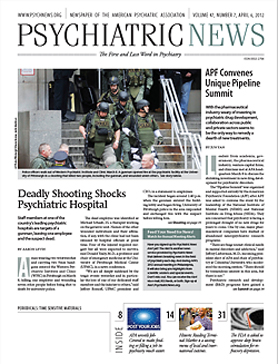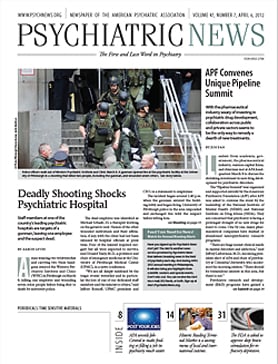The APA Board of Trustees held its spring meeting in Arlington, Va., on March 10 and 11. This was my last full Board meeting as your president, and as always, I’d like to share the highlights of the meeting with you. (For additional coverage see
APA Prepares to Help Members Navigate Seismic Changes.)
We began with my report to the Board, in which I outlined some of the work under way by members of the Board, the Assembly, and the APA staff since our last meeting, a great deal of which was on the agenda of the meeting for in-depth discussion. There is always a lot going on, including federal budget-deficit concerns, health care reform and the Accountable Care Act, the flawed sustainable growth rate (SGR) formula, graduate medical education (GME), scope of practice, parity implementation, maintenance of certification (MOC), maintenance of licensure (MOL), coding and reimbursement, and mental health in the military—just a partial list.
The second report was from Jay Scully, APA’s CEO and medical director. Jay’s written report is always informative and is posted on the APA Web site in Members Corner—I encourage you to take a look. With Nick Meyers, head of APA’s Department of Government Relations, Jay went over some pretty sobering numbers at the federal level related to an anticipated budget reduction in the Department of Health and Human Services from $85 billion to $71.7 billion, leading to potential major reductions in key areas such as GME, both direct and indirect. (The Board meeting was followed by APA’s Advocacy Day, when many of us took these and other concerns directly to members of Congress on the Hill. See the next issue for coverage of Advocacy Day events.)
The ongoing and seemingly insoluble problem of the SGR was discussed. Though there is general bipartisan agreement to repeal the SGR, there is no agreement on how to pay for it. The latest 10-month extension, lasting until December 31, was partially paid for by cutting $11 billion from hospitals treating low-income patients; proposals on how to fund a permanent “fix” (estimated to be over $300 billion at this point) are draconian and are not included in the wrangles about how to reduce the deficit.
Another highlight of Jay’s report was to welcome Jeff Borenstein as the new editor in chief of Psychiatric News. Jeff gave a brief summary of his early planning, joined by APA Publisher Becky Rinehart, who reviewed the new format of Psychiatric News, plus an ambitious agenda for American Psychiatric Publishing that moves strongly into the arena of electronic publishing. Bill Bruce, chief information officer, followed with an update on the new Web site for APA, soon to have its debut.
David Fassler presented the treasurer’s report, confirming that APA’s financing remains stable and solid. I took the opportunity to congratulate all who worked so hard to restructure and consolidate our organization so successfully, also noting with appreciation the hard work by all APA staff, who are doing more with less.
We heard a report from Paul Summergrad, chair of the new Work Group on the Role of Psychiatry in Health Care Reform, assisted by Sam Muzynski. The work group has had several conference calls and an in-person meeting; members include Carol Bernstein, Peter Buckley, Bob Cabaj, Frank deGruy, Benjamin Druss, Anita Everett, David Fassler, Patrice Harris, Roger Kathol, Wayne Katon, Gray Norquist, and Ed Pontius. Paul gave a great summary of the group’s review of the changing health care landscape. He noted that growing evidence supports the value of psychiatric integration into medical care settings, particularly for older patients (a rapidly growing segment of the population), who have substantial medical comorbidity. There is a strong consensus of opinion that integrated care must lead to integrated funding and that behavioral health is lagging behind in the development of effective electronic health records.
A good part of the afternoon of the first day was spent on DSM-5. Ken Kendler gave an update on the work of the Scientific Review Committee, which reviewed a substantial number of the expected proposals for change. David Kupfer and Darrel Regier provided an update on the timeline for DSM-5, which remains on track for publication in 2013. The Board had an extensive discussion about the remaining steps necessary to complete the project.
The second day of the Board meeting began with a report from Mary Helen Davis on MOC and MOL, predominantly focusing on the need to monitor state considerations of MOL. I reported to the Board that a joint e-mail from me and Ann Sullivan would be sent shortly, outlining how to access the ABPN-approved Performance in Practice modules developed by the APA Division of Education. These modules are being offered free of charge to all APA members.
Dilip Jeste presented an update from the Work Group on International Activities, and Joe Rubin reviewed the work of the Membership Committee. The Board supported several steps to enhance international membership and encourage MITs and ECPs to join and participate in APA. Ann Sullivan presented her report as the speaker of the Assembly, emphasizing the Assembly recommendation to explore reinstating the APA State Legislative Institutes, a recommendation the Board supported.
The concluding report was from Jay Scully and Paul Burke on the work of the American Psychiatric Foundation, which is impressively active on many fronts, including the Corporate Advisory Council, Partnership for Workplace Mental Health, Give an Hour, the PBS program “Healthy Minds,” Joining Forces, Typical or Troubled, Helping Hands Grants, Minority Mental Health Awards, the Judges’ Leadership Initiative, and the extensive agenda being carried out by the American Psychiatric Institute for Research and Education.


